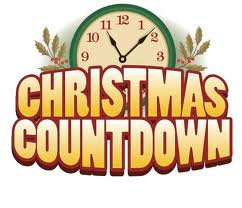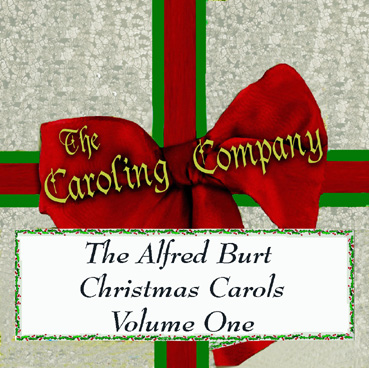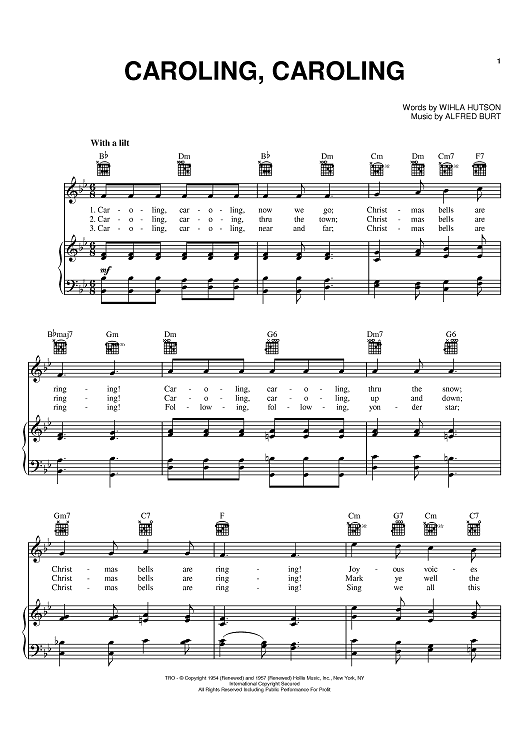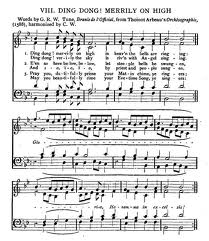The Alfred Burt Carols ~ Christmas Countdown
Sunday, December 13, 2020 by Mary O'Connor | Christmas

I could have turned the Alfred Burt Carols into the next 15 parts of this series but I decided that was a bit too easy on me!
I love this story - it's a wonderful family tradition from the Burt family.
Starting in 1922, Alfred Burt's father created a Christmas card for family members and parishioners. On these cards were original Christmas carols, with both the words and music by the Reverend Bates Burt. For the family Christmas card in 1942, Bates asked his son to write the music for that year's carol , "Christmas Cometh Caroling."
From then on, Alfred would write the music for the family's Christmas cards, and the "Alfred Burt carols" were born.
Over the next several years, and as the Burts' circle of friends grew, the Christmas card list grew from 50 to 450 people. But still, the Alfred Burt Carols remained unknown outside the Burts' growing mailing list.
That changed with the 1952 carol, "Come, Dear Children". Burt finished writing the music during a rehearsal with the Blue Reys, the vocal group with Alvino Rey's orchestra. He asked them to sing it so he could make sure the harmonies worked; they liked it so much that they asked Burt if they could sing it at the annual King Sisters Christmas party. It proved to be a hit among the partygoers, and served to introduce Burt's carols to Hollywood, California.
More about the Burt family and the Christmas Carol tradition: http://www.alfredburtcarols.com/
Alfred Burt's Carols:
- "Christmas Cometh Caroling" (1942)
- "Jesu Parvule" (1943)
- "What Are the Signs" (1944)
- "Ah, Bleak and Chill the Wintry Wind" (1945)
- "All on A Christmas Morning" (1946)
- "Nigh Bethlehem" (1947)
- "Christ in the Stranger's Guise" (1948)
- "Sleep Baby Mine" (1949)
- "This Is Christmas" (also known as "Bright, Bright, the Holly Berries") (1950)
- "Some Children See Him" (1951)
- "Come, Dear Children" (1952)
- "O, Hearken Ye" (1953)
- "Caroling Caroling" (1954)
- "We'll Dress the House" (1954)
- "The Star Carol" (1954)
Burt finished the last of his carols, "The Star Carol", on February 5, 1954. He died less than 24 hours later, at the age of 33.
One of the best known of these today is Caroling Caroling (lyrics by the church organist at his father's church, Wihla Hutson)
The Salt Lake Vocal Artists perform 2 carols; "Caroling, Caroling" and "We'll Dress the House" by Alfred Burt live in concert on December 17, 2011 in Holy Family Catholic Church, South Ogden, Utah under the direction of Dr. Brady Allred.
What's your Christmas tradition?
Still, Still, Still ~ Christmas Countdown
Saturday, December 12, 2020 by Mary O'Connor | Christmas

Still, Still, Still is an Austrian Christmas carol and lullaby. In German its first line is "Still, still, still, weil's Kindlein schlafen will!" (Hush, hush, hush, for the little child wants to sleep!)
The melody is a folk tune (authorship unknown) from the State of Salzburg. The tune appeared for the first time in 1865 in a folksong collection of Maria Vinzenz Süß (1802-1868), founder of the Salzburg Museum; it has changed slightly over the years but remains attributed to G. Götsch.
The words, which run to six verses in German, describe the peace of the infant Jesus and his mother as they sleep. There are various English translations. This is one version:
Still, still, still,
One can hear the falling snow.
For all is hushed,
The world is sleeping,
Holy Star its vigil keeping.
Still, still, still,
One can hear the falling snow.
Sleep, sleep, sleep,
'Tis the eve of our Saviour's birth.
The night is peaceful all around you,
Close your eyes,
Let sleep surround you.
Sleep, sleep, sleep,
'Tis the eve of our Saviour's birth.
Dream, dream, dream,
Of the joyous day to come.
While guardian angels without number,
Watch you as you sweetly slumber.
Dream, dream, dream,
Of the joyous day to come.
Ding Dong! Merrily On High ~ Christmas Countdown
Friday, December 11, 2020 by Mary O'Connor | Christmas

"Ding Dong Merrily on High" first appeared as a secular dance tune known as "le branle de l'Official" in a dance book written by Jehan Tabourot (1519–1593). The lyrics are from English composer George Ratcliffe Woodward (1848–1934), and it was first published in 1924 in his The Cambridge Carol-Book: Being Fifty-two Songs for Christmas, Easter, And Other Seasons. Woodward had an interest in church bell ringing, which no doubt helped inspire this carol
Ding dong! merrily on high
In heav'n the bells are ringing:
Ding dong! verily the sky
Is riv'n with Angel singing.
REFRAIN
Gloria,
Hosanna in excelsis !
Gloria,
Hosanna in excelsis !
E'en so here below, below,
Let steeple bells be swungen,
And "Io, io, io!"
By priest and people sungen.
REFRAIN
Pray you, dutifully prime
Your matin chime, ye ringers;
May you beautifully rime
Your evetime song, ye singers.
REFRAIN
Note: "Swungen" and "Sungen" in the second verse are archaic English verb forms.







